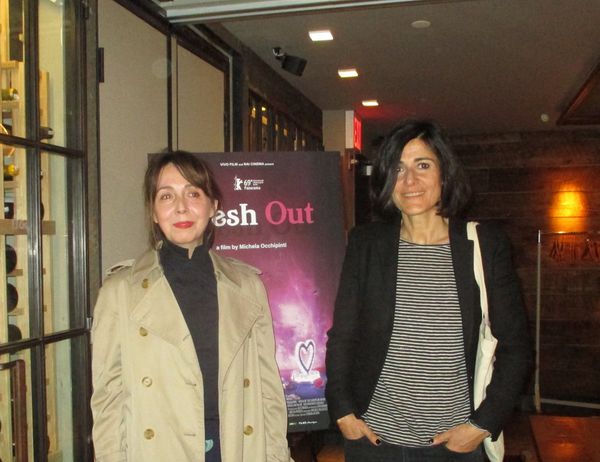Open Roads: New Italian Cinema, presented by Film at Lincoln Center and Istituto Luce Cinecittà is set to open next month with Claudio Giovannesi's Piranhas (La Paranza Dei Bambini) and will have a screening of La Commare Secca, Bernardo Bertolucci's début feature in honour of the director who died last year. Other films of note include Paolo Sorrentino's Loro, starring Toni Servillo (from the Oscar-winning The Great Beauty) and Riccardo Scamarcio, Paolo Virzì's Magical Nights (Notti Magiche), Valerio Mastandrea's Laughing (Ride), Alba Rohrwacher as Lucia in Gianni Zanasi's Lucia’s Grace (Troppa Grazia), and Valeria Golino's Euphoria (Euforia) with Jasmine Trinca and Mastandrea.
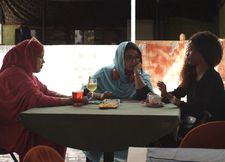 |
| Verida Beitta Ahmed Deiche with Amal Saad Bouh Oumar and Aminetou Souleimane in Flesh Out |
An Italian film that was a highlight of this year's Tribeca Film Festival is Michela Occhipinti's brilliant Flesh Out (Il Corpo Della Sposa), co-written with Simona Coppini, produced by Gregorio Paonessa and Marta Donzelli (Susanna Nicchiarelli's Nico, 1988, Laura Bispuri's Sworn Virgin, Daughter Of Mine). It is the story of Verida (Verida Beitta Ahmed Deiche), a Mauritanian girl who is going through the customary three-month preparation for her arranged marriage. These preparatory measures include "gavage", the traditional fattening up of the bride, shown here in excruciating detail. Occhipinti vividly illuminates the paradoxes of ownership of the female body and the wildly varying pressures put on women to conform to the chance standard of beauty that place and time of birth impose.
Michela Occhipinti joined me for a conversation on Flesh Out.
Anne-Katrin Titze: I made your film an Early Bird Highlight for Tribeca.
Michela Occhipinti: It was amazing. Thank you! First I saw the photo of Naomi Watts, and then the mentioning of Daniel Day-Lewis and then - my name! Then I thought something is going terribly but fantastically wrong here.
AKT: Not wrong at all. Daniel Day-Lewis's character in Phantom Thread is very upset by noises, especially eating noises.
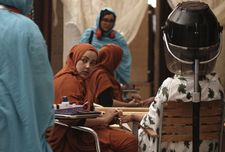 |
| Verida working at her grandmother's beauty salon |
MO: I remember, with the sister and the girlfriend.
AKT: In your film, right away I felt the misophonia. Before we see anything we hear the swallowing.
MO: Yes, the swallowing.
AKT: Sound is so important in your film.
MO: I'm so happy you said that. After I read the article I published it on Facebook and I tagged all the people who worked in the sound of the film. And I wrote to them that this is a really great compliment because for me it was paramount that the sound was as important as the visuals.
For me sound is so important to drag you into a story. In my notes from the beginning I wrote down that we have to have swallowing noises, flies, wind. Some are even a tiny bit accentuated in respect to the real truth because I wanted to create a bit the sense of nausea. It's not a good film to see before dinner.
AKT: No, it isn't. And you don't want to drink milk ever again.
MO: Ever again!
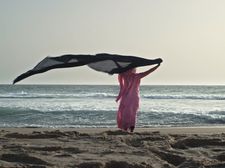 |
| Michela Occhipinti on Verida: "Why don't we just embrace the body how it was made by nature?" |
AKT: That's good actually for the environment. I don't drink milk anyway and there are plenty of vegan options. The whole idea of gavage - I only knew this expression in the context of foie gras. I was shocked to find out that this, the fattening up of the bride, was a tradition in Mauritania that existed for centuries and still does. How did gavage cross your path?
MO: I didn't know anything about it and never heard about it before 2011. The reason was personal. I was looking at myself in the mirror, I saw thin lines, I have a certain age. I was a bit upset, it's decay, okay, I'm getting old. I live in a society where you have to stay young and I started looking around more what we women do to our bodies. I thought, okay, you not only have to be young, you have to be thin, you have to have boobs, you have to have cheeks, you have to have butts. It was not always like that. In the Sixties you had to be skinny, in the Fifties you had to be [Michela gestures].
AKT: Hourglass shaped.
MO: Yes, hourglass shaped. In the 19th century, you had to be really flourishing. Why can these aesthetic patterns, these beauty standards change so much? And who dictates it? I spent a few months being very heavy hearted about this subject. We have so much pressure on our bodies as women. If men have it, they have it very small in all societies in the world.
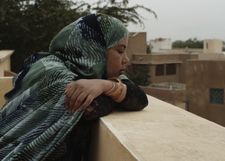 |
| Michela Occhipinti: "There it's the future husband who brings the dowry but also by giving their daughter to a man, the family gets rid of her financially." |
So I was thinking, how do I tell this thing that is weighing on my chest? And by chance, I found it in a magazine attached to an Italian newspaper. A little, little article: Women in Mauritania doing gavage. I thought this is crazy - it was like a mirror. This is the perfect story to talk about women's bodies with a little twist.
AKT: The one common thread that seems to be negligible is women's wellbeing. In any of this.
MO: Exactly. The shape of your body that you're trying to achieve is totally marginal and secondary to the process you undergo. It's trying to change your body, either to lose weight or to put on kilos, or whatever it is.
AKT: Skin whitening.
MO: Everything, yes. Why don't we just embrace the body how it was made by nature? Because we are constantly bombarded with images. Gavage is getting less now. I would say that 20% of girls do it in the city. 40, 35% still do it in the desert.
AKT: The scene in the desert is extremely powerful because as an audience we don't fully understand what is going on. At least I didn't really understand - who is this woman? It is a nightmare and I like that very much.
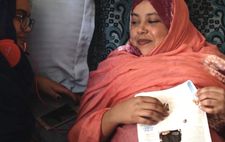 |
| Amal with Verida: "The shape of your body that you're trying to achieve is totally marginal and secondary to the process you undergo." |
MO: It's good that you don't know exactly.
AKT: It ties in with all kinds of other rituals - witchcraft, foot binding. One of the girls has her foot in a contraption.
MO: This woman is called a gaveuse. These are the women who will feed your daughters or granddaughters. It's the rain season in the desert, it's called hivernage. When there's a little more grass, the camels, the goats eat a little more and make a little more milk. They send the girls to the gaveuse either because they are not eating or they send them like they would send them to a beauty farm.
In the desert it happens a lot to young girls, like 8, 9. Because when you put on many many kilos very fast, you develop, you have your period earlier. And you can be given in marriage. For the family on an economical level it's very good. There it's the future husband who brings the dowry but also by giving their daughter to a man, the family gets rid of her financially. And it's considered a sign of wealth. Because if you're wealthy you can sit down and do nothing because you don't have to work and you get fat and fatter.
AKT: And that ties back in with the foot binding idea.
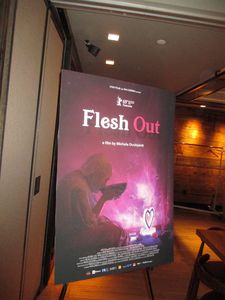 |
| Flesh Out US poster at the Park South Hotel in New York Photo: Anne-Katrin Titze |
MO: That thing that seems a bit violent. In fact, it is, because they tell you you have to eat again what you threw up. But that thing doesn't actually hurt that much. They put your finger [or toe] there, just to put a little pressure so that you are not focused anymore on your nausea, but you're focused on what you're feeling on your foot.
AKT: Oh god.
MO: So you go on eating. The guy with the scale doesn't exist anymore [a man comes every week with a scale to weigh the bride and record her weight gain] but existed in the past. That's why I made a fiction film because I could put in all the things I saw and heard of, regardless of when they happened. I asked Verida: "Do you have a scale?" And she said, "No, why? We're not at the butcher's."
AKT: Some of the imagery was beautifully constructed. At the market, we see Barbie-like dolls.
MO: In the plastic?
AKT: In the plastic. Some of them hang upside down. I tied that to your last shot where we see Verida's reflection.
MO: You are fantastic. The viewer that one would hope to have. It's true. I didn't think about this but it's fantastic what you're saying. The dolls I filmed them exactly as they were. I thought, once we're gone from Mauritania and the film is shot … but then the editing, we cut so many things, we changed, we replaced things.
Coming up - Michela Occhipinti on her editor Cristiano Travaglioli, who is Paolo Sorrentino's longtime collaborator, Christophe Lambert and an homage to Marco Ferreri's I Love You, Johnny Cash and June Carter's Ring Of Fire.
Open Roads: New Italian Cinema runs from June 6 through June 12 at the Walter Reade Theater of Film at Lincoln Center.








